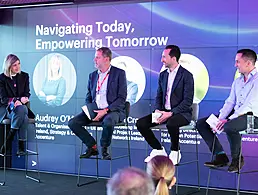There’s a lot of talk about future jobs right now. But what exactly are these jobs?
Yesterday (22 November), the Irish Government held a Future Jobs Summit, highlighting the awareness that the future of work is an important topic that needs to be addressed.
However, while the jobs of the future have become widely discussed as a topic, a lot about them is still unknown, by virtue of being in the future.
After all, what the future holds changes every day and none of us have psychic powers. But that doesn’t mean we can’t glean certain things based on deep analysis.
Multinational digital operations business Cognizant recently released its Jobs of the Future Index, which explores the trends and patterns in a set of jobs. The index was compiled with analytical support from economic research firm, ESI ThoughtLab.
Jobs of the future are growing fast
The index is tracking the jobs of the future it has identified, with a base period of Q3 in 2016. It shows that these jobs of the future have grown by 47pc in the last two years. The index also shows a 7pc jump in the last quarter alone.
So, what are the jobs of the future and how are they determined? According to Cognizant, the selected jobs have been or are expected to grow, especially considering the rising digitisation of work such as software developers.
The jobs are also integral to industries with expected growth or transformation in the coming decades.
First, they are occupations that have been growing or are expected to grow, particularly when we take into consideration the rising digitisation of work and the workplace, such as software or mobile app developers.
Second, they are occupations that are integral to industries that are expected to grow or transform in the coming decades, such as customer experience or AI.
Finally, Cognizant applied a digital filter to these jobs, identifying the jobs that require digital technology skills as well as traditional skills.
What are the jobs of the future?
Based on the macroeconomic, political, demographic, societal, cultural, business and technology trends observable today, Cognizant proposed a list of 21 jobs that will emerge in the next 10 years and be central to the future of work.
Last year, the site listed an initial 21 jobs, including AI-assisted healthcare technician, quantum machine learning analyst and cybet-city analyst. The full report from last year is available here.
This year’s report brings many new jobs that match the growing trends around cybersecurity, data analytics and the importance of meaningful jobs. The increasing need to protect against cyberattacks will bring more jobs in this area, which will bring even more demand to an already talent-starved industry.
The design industry is also expanding fast and, according to Cognizant’s future jobs report, even more design roles will appear across a wide range of industries, from smart homes to e-sports arenas.
Finally, the need for data experts is already reaching critical levels. This is not necessarily because the talent is lacking the way it is in cybersecurity, but rather the fast-growing need to collect, mine and analyse data across a wide range of businesses.
Data trash engineer
One of the earliest expected jobs of the future is a data trash engineer. A person in this role would be expected to transform data from trash to treasure.
“Data that has not been used by anyone in the past 12 months, has no foreseeable use as initially imagined and isn’t necessary for regulatory purposes, can still be turned into insights,” according to the report. “Just like food waste is a carbon that can be used to produce green energy, data waste is still meaningful if cleaned.”
With a world of data scientists and analysts taking in exponential amounts of data, it comes as no surprise that there is plenty of ‘data trash’ to be sifted through, so it’s only a matter of time before a data trash engineer will be needed.
Cyber agents and forecasters
A cyberattack agent is the second-earliest expected new role according to the report, while a cyber-calamity forecaster comes in at number 10. Both of these roles, or versions of them, are expected to come into reality in the next five years.
The old adage goes: “The best offence is a good defence”. However, with cybercriminals becoming more advanced all the time and breaches happening on a weekly basis around the world, Cognizant’s report predicts this adage will be turned on its head for the cybersecurity sector.
A cyberattack agent’s role is predicted to be centred around targeting adversaries as opposed to building defences against potential attacks.
Meanwhile, a cyber-calamity forecaster will be expected to predict potential attacks and reveal overlooked possibilities for breaches based on trends and analysis. Both roles are assumed to be highly technical.
The importance of purpose and meaning
Increasingly, statistics and reports have told us that employees are looking for purpose and meaning in their work all the time. Furthermore, society is turning to brands and companies that align more with their values.
These stats don’t lie, but how does this affect the jobs of the future? Cognizant’s report predicts that a chief purpose planner will become a real job in the next 10 years. This role would theoretically entail mastering a corporate brief in order to “help clients build, maintain, manage and burnish their purpose in the minds of an increasingly crowded market.”
The more important purpose, meaning and values become to the world, the more it will affect a company’s bottom line. In turn, it is to be expected that a job will be created to ensure that this side of the business is as effective as possible.
Check out the full list of Cognizant’s jobs of the future below. You can read the report in full here.
21 jobs of the future
1. Data trash engineer
2. Cyberattack agent
3. Juvenile cybercrime rehabilitation counsellor
4. Voice UX designer
5. Joy adjutant
6. Head of business behaviour
7. Smart home design manager
8. Algorithm bias auditor
9. Uni4Life coordinator
10. Cyber-calamity forecaster
11. E-sports arena builder
12. Tidewater architect
13. Virtual identity defender
14. Head of machine personality design
15. Virtual reality arcade manager
16. Vertical farming consultant
17. Machine risk officer
18. Subscription management specialist
19. Flying car developer
20. Haptic interface designer
21. Chief purpose planner




